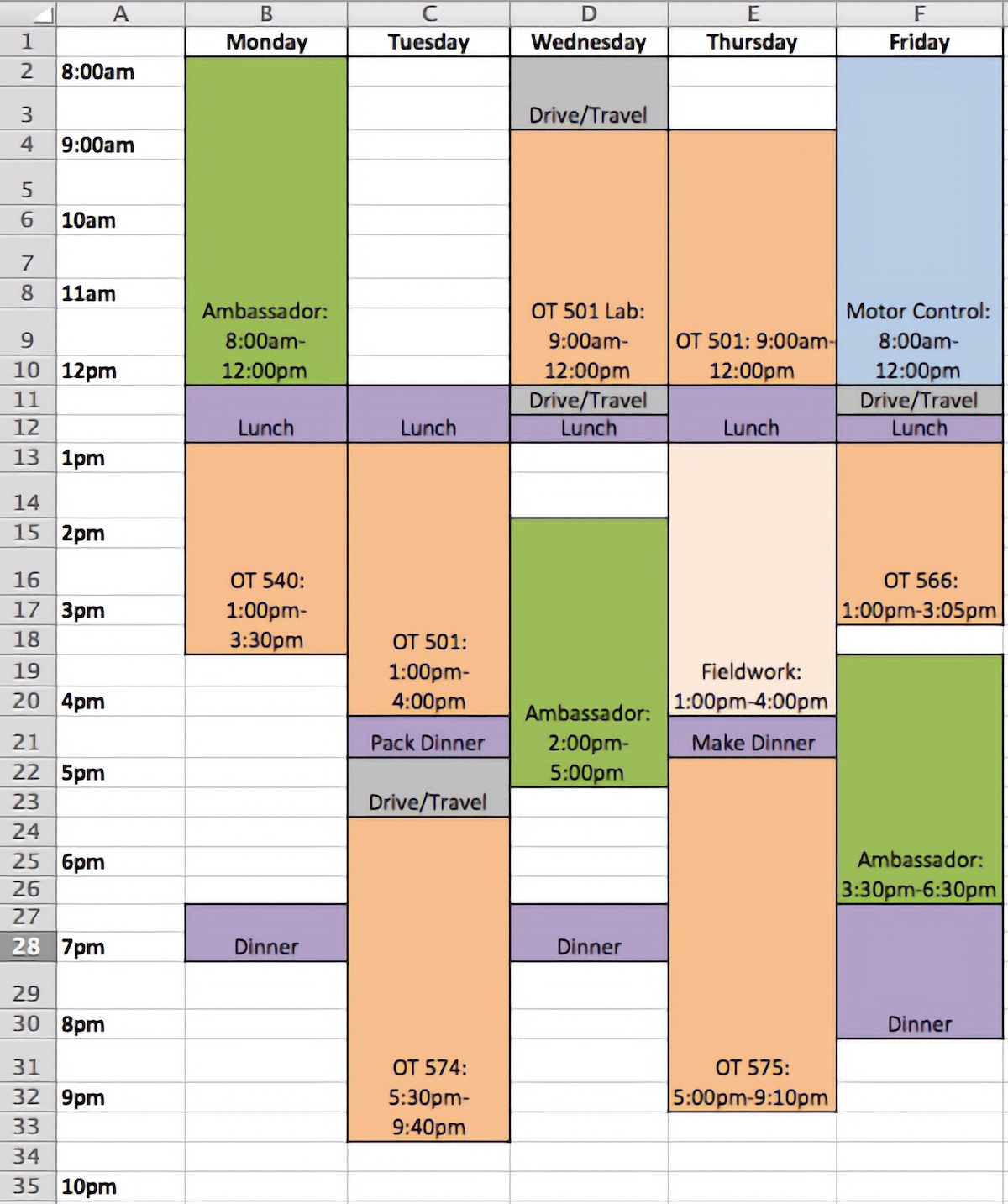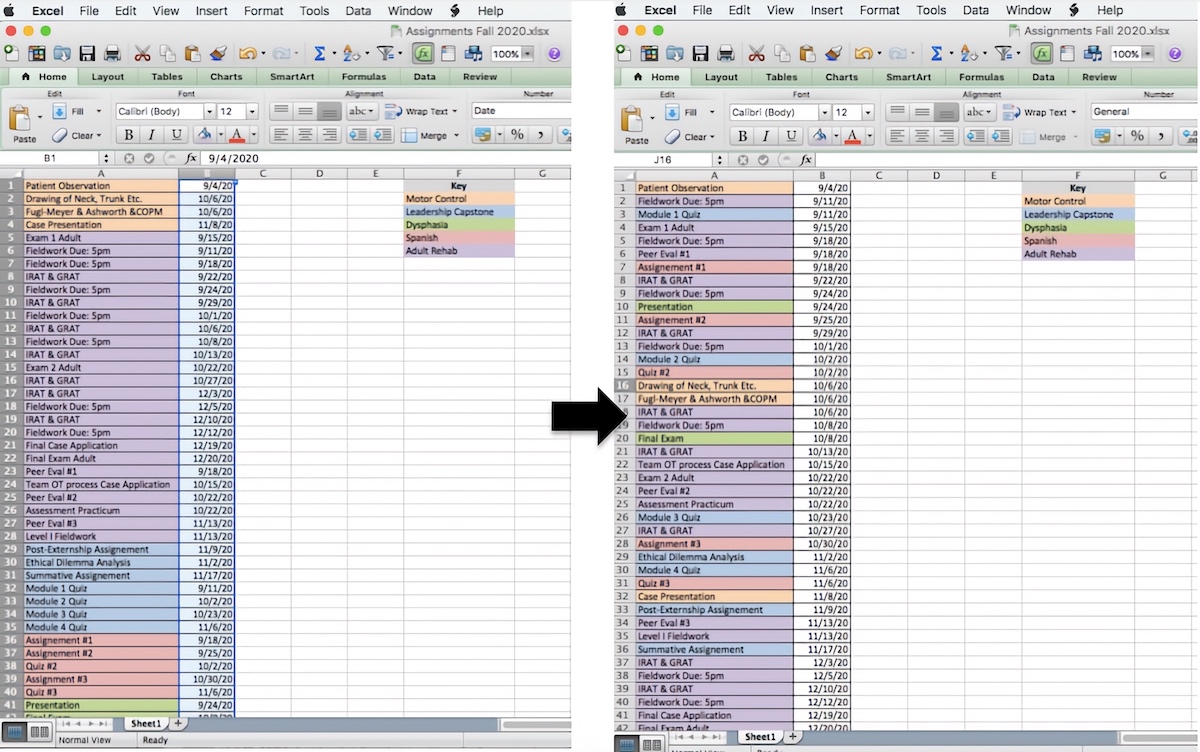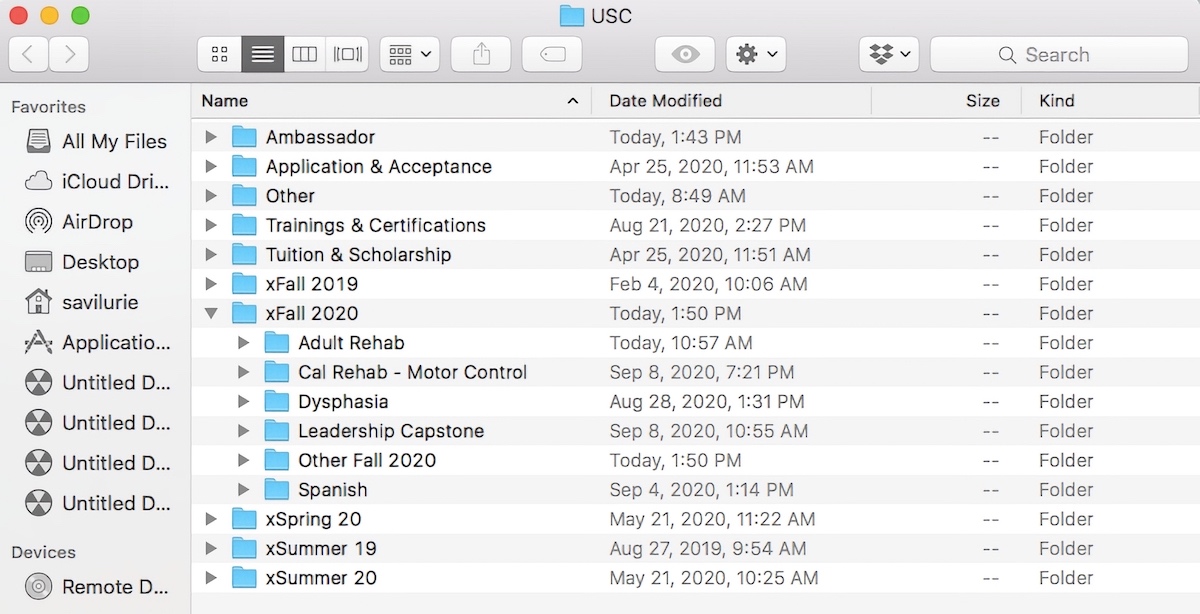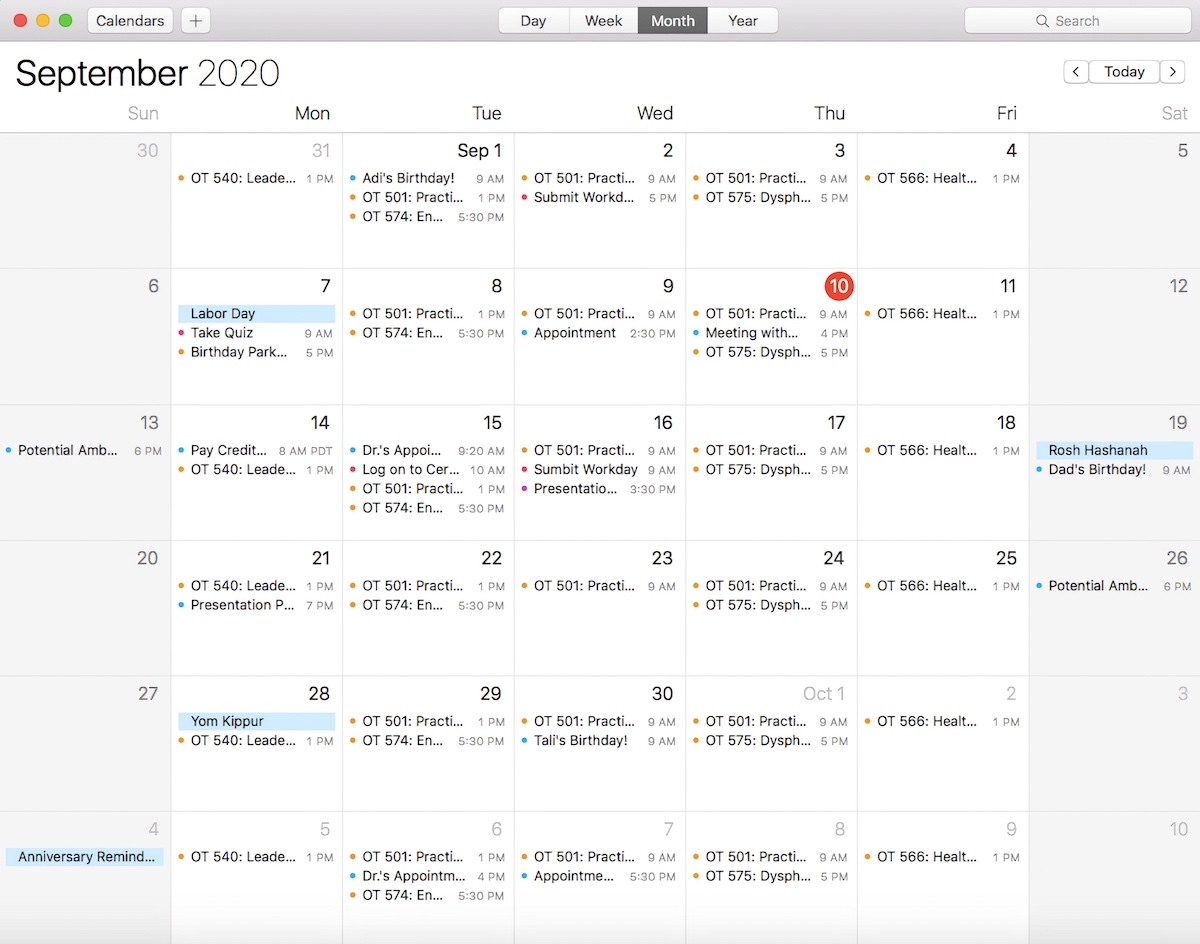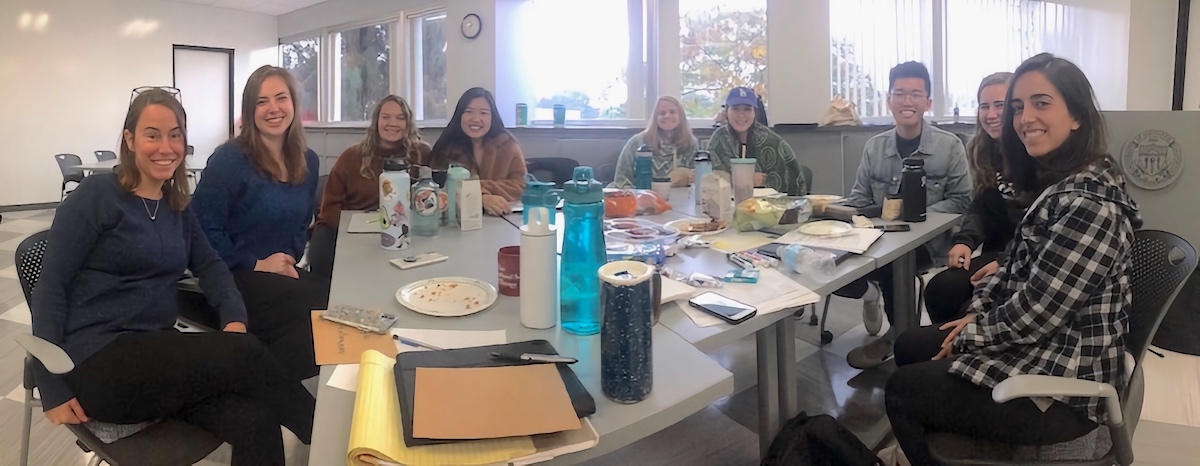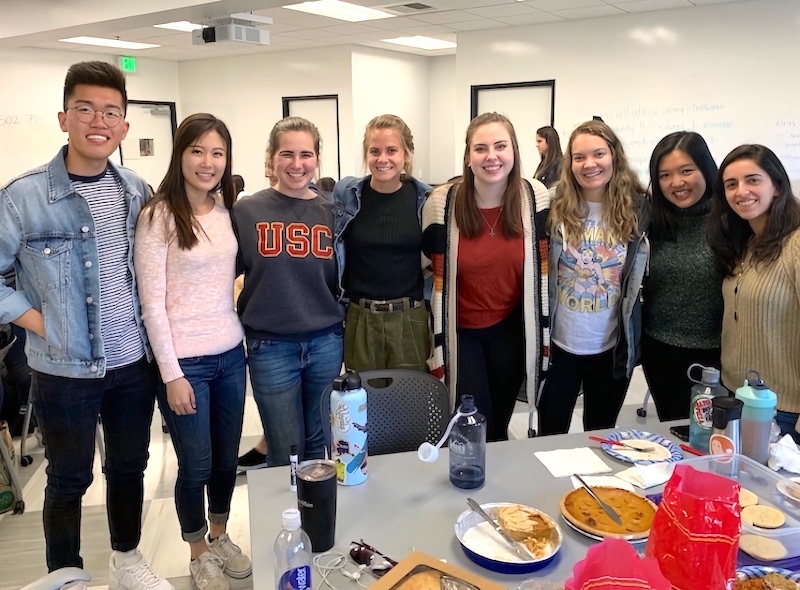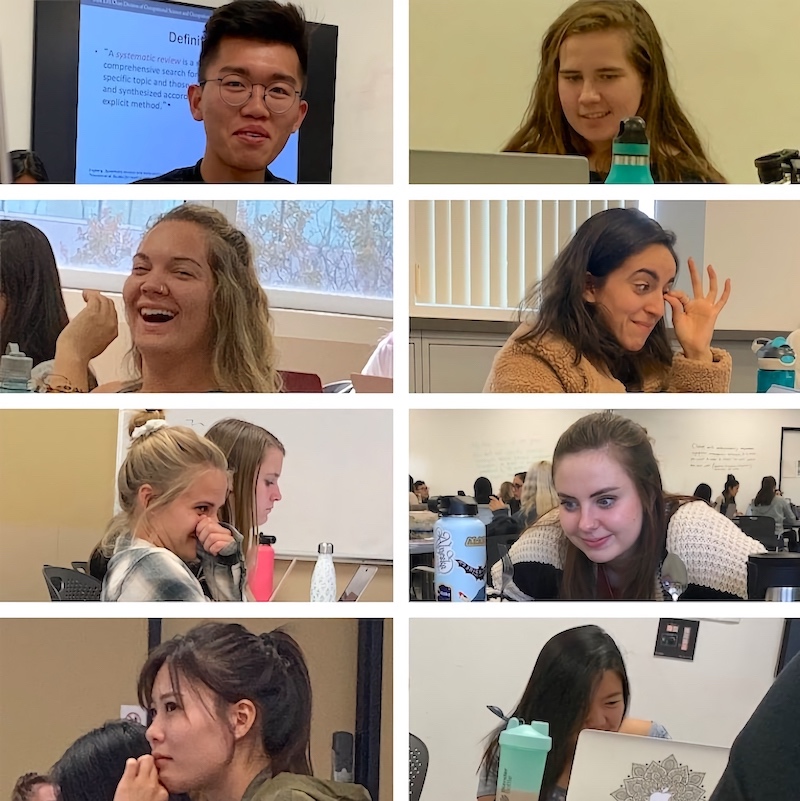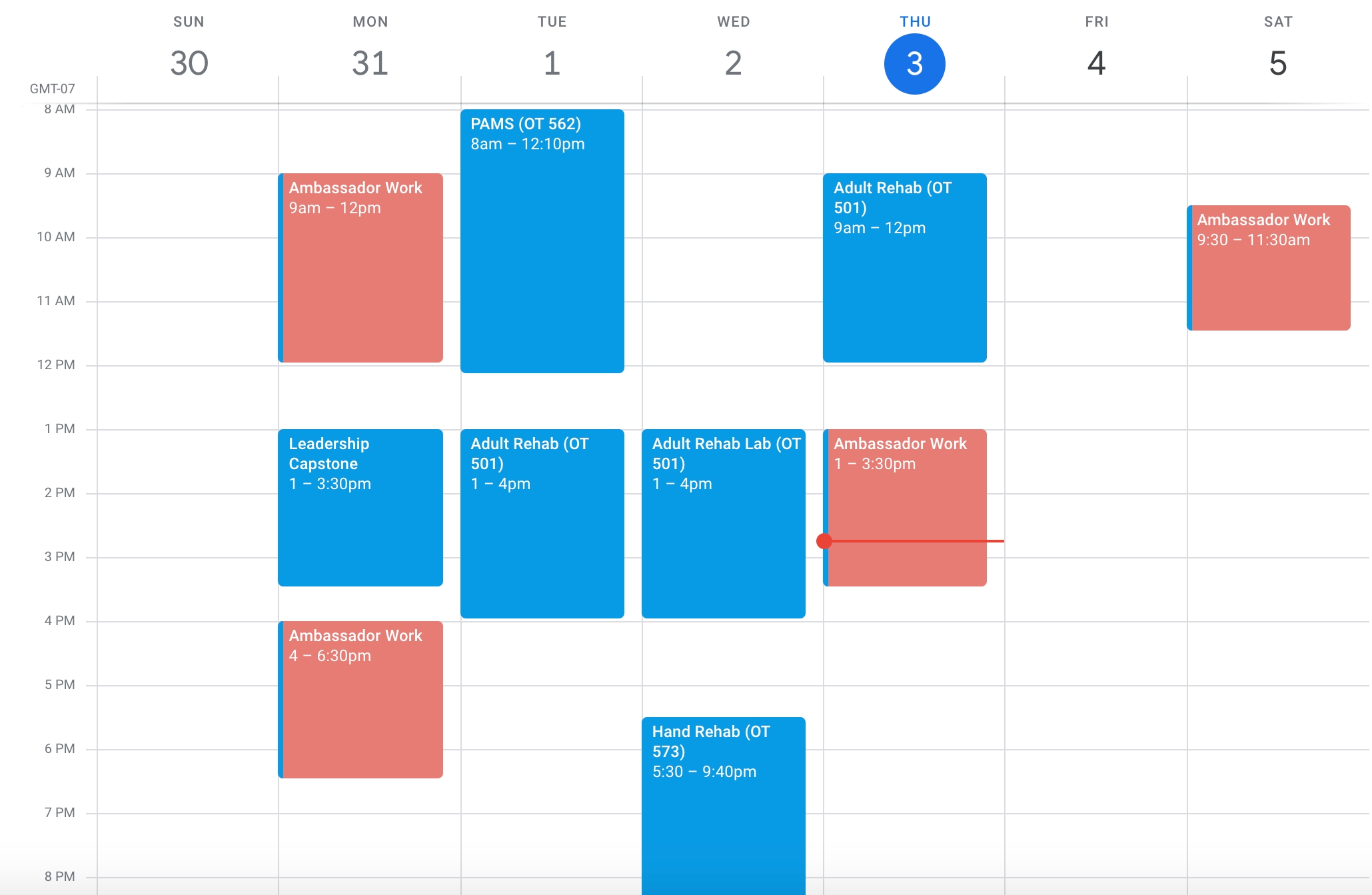Student Blog
Classes
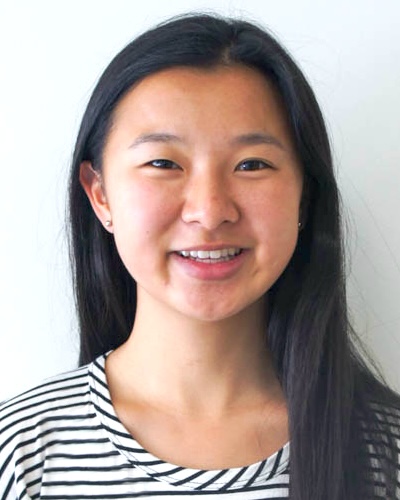
Put Tracking Apps to the Test ⟩
September 30, 2020, by Bethany
Classes Life Hacks
In OT 563: Occupational Therapy in Primary Healthcare Environments, Dr. Valasek gave us an assignment. In primary care (and other OT environments), we may assign our clients a log to learn more about their lives and what affects their occupations, so we as students have to complete a log for ourselves. We get to better understand our practice, not just by practicing, but by experiencing what we may ask our clients to do. Dr. V let us know that we had to track for a week, but she was giving us two weeks to complete the assignment, helping us to understand that some weeks are just not good weeks to have to be responsible for tracking. She was also very helpful in permitting a variety of things that we could track (from mood to food) and in suggesting a variety of methods in which to complete this log. Beyond paper tracking methods, there are a surprising number of phone apps to track things and give reminders for goals, too! Daylio can be used for mood and habit tracking. Anxiety Tracker tracks . . . well . . . anxiety, if you hadn’t guessed. Habit Bull keeps you on track for habits. Lose It! can be used to track food and calories. And there are many more! I decided to check out Lose It! Let’s see how this goes . . .
Monday, Day 1
Today was spent familiarizing myself with the app. When you type in a food to Lose It!, there are so many options, it’s overwhelming. At the same time, I’m glad that they give options for things. I feel like I’d be even more stressed if I chose to do my own paper trackers and hand to configure ingredients and calorie count by myself. Or I’d get lazy and go back to fill in previous days’ meals without remembering exactly what I ate. I’m curious to see if I like the apps enough to keep going after this week.
Tuesday, Day 2
I didn’t eat lunch. I felt lazy about wanting to log food, got distracted by a letter my cousin sent me, and just ended up doing other things during my break. It makes me wonder if food logging accurately portrays what I eat in a week, but at the same time, part of logging is to bring the user’s awareness to their own situation and behaviors, so maybe I’m learning that I eat too much . . . hmmm. The funniest part of today was trying to recognize some of the Chinese food names in English. I had fun estimating dinner portion sizes with my mom, guessing if the amount of rice I ate was one cup or two thirds of a cup. My mom is a physician, so it was fun to hear that Lose It! is one of the apps that she recommends to her patients! She gets to learn a little bit more about it this week, too.
Wednesday, Day 3
I found what I like best about Lose It! You can scan barcodes on foods and it automatically inputs the food, the calories, everything! I tried it on my cereal in the morning, and it was almost more tempting to eat things out of the box, instead of homemade meals. Then, that evening, I discovered the recipe option! You can input all of the ingredients in a dish, put how many portions it makes, and it calculates everything for you. You can also save the recipe, so if it is a dish you make often, it is easy to go back and select. I asked my dad what went into his delicious eggplant dish, got an accurate calorie count for my meal and the recipe for a dish I love. I guess it takes longer than I thought to become accustomed to all of the characteristics of an app, and there are more helpful features than I imagined.
Thursday, Day 4
Today was easier. I got more into the habit of logging food right before I ate it. I also realized that previous meals pop up to make selection of eating leftovers easier. I noticed that the app also has water tracking, which I would love to use, but I don’t think I want to pay for the upgrade. The one downside of today is that Lose It! has me on a schedule with a calorie limit, and I really want brick toast. (If you look up “Oh My Pan!” you can find a very good visual example of my food craving for the day.)
Friday, Day 5
This was the first day I went over my calorie limit. Wow. That little red mark telling me I did something wrong was quite disheartening. I needed a reminder from someone close to me that food tracking is not always perfectly accurate, and that it is okay to have a cheat day. You have to take in the weekly budget numbers, too, and there is a lot more to account for in life that affects what you eat. In the end, I decided to let the app help me be aware of what I was eating, but not kill the vibe. And what can I say: The In-n-Out was worth it.
Saturday, Day 6
Tracking three meals a day has almost become habit. I also liked that I can input the exercise I completed for the day, and it goes into the net calorie count. It’s difficult to estimate calories burned from exercise, but it’s kind of nice to know that you can input that information. No crazy new discoveries on the app today. I’m looking forward to seeing how the week fills out.
Sunday, Day 7
Today my mom asked me, “Are you done tracking yet?” She wanted me to eat cookies with her for dessert. I can definitely see how this may be a downside to using a tracking app. It can affect even social aspects of life! But in the end, I think it’s kind of fun to be able to have more of an awareness of what I’m taking in. And I think I’ll continue to use the app, even if I track less regularly or even if I’m a little inaccurate, the most important thing is that it helps me become more aware of my own health.
I truly enjoy learning about the need for and the implementation of occupational therapy in primary care, and this class has definitely brought some unique learning experiences. I’m excited to keep learning about this area of OT and to keep building skills that I can use in the future.
⋯
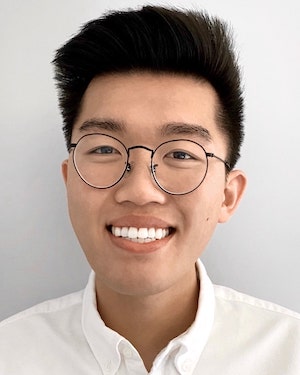
Humans of USC Chan Volume 1 ⟩
September 21, 2020, by Calvin
Classes Diversity Videos What are OS/OT?
When I was applying to OT school, I remember that I really wanted to get different student perspectives on what programs were like and how they navigated graduate school. As a student ambassador, I feel so lucky to have the opportunity to share my experiences with all of you, but I know that there are so many other extraordinary voices in the division too!
So, I gathered some second-year Entry-Level Master’s students to come and talk about what their OT school experiences have been like so far! We went over topics related to what kind of OT they’re interested in, what their favorite classes and memories are, and what challenges they’ve faced. They even shared some advice for all of you thinking about applying to the program! If you watch it through YouTube, the video is time-stamped with each topic in case you ever want to go back to a specific conversation.
I hope you find this video helpful and that these diverse perspectives give you more insight into what student life is like in the Master’s program! Welcome to the Humans of USC Chan!
⋯

Tips to Stay Organized ⟩
September 10, 2020, by Savi
Classes Life Hacks
During my time in graduate school, I found that success is closely tied to organizational skills. Towards the beginning of each semester, I typically become overwhelmed by my new schedule and all of the combined assignments. I, therefore, have discovered a few simple ways to help ease my concern and make it ALL seem a little more manageable. Here is a list of a few tips you may find helpful to assist you with staying organized throughout the semester.
1. Weekly Schedule
Develop a weekly schedule PDF, Excel, or Word document that you can always refer to when you need to schedule a meeting, a study session with friends, a doctor’s appointment, or time to engage in a meaningful and rejuvenating occupation such as exercising. This weekly schedule can be color-coded and can include everything that you have committed your time to on a continuous weekly basis. This will allow you to view your weekly class, volunteer, fieldwork, and work schedule in one location, making it easy to see what time you have available in order to schedule events or utilize and assign your free time to activities and assignments. I also add in blocks for driving and eating to better understand what time I have completely free and what time I am filling with other necessary occupations. Here is my weekly calendar example:
2. Excel Assignment List
At the start of each semester I go through every single syllabus and note the assignment with the due date on an excel document. I color-code each class and then use the sort tool to organize the assignments by the due date. This way I can scroll through at the end of each week to see what I need to do over the weekend, plan what I can complete during my free time allotted in my weekly schedule, and check to make sure I have completed the all of the assignments before I go to bed each night. This is a quick and easy way to have all the assignments and exam due dates listed in one location! You can also delete the row or change the color of the assignment once it is completed to feel a sense of relief and instant satisfaction. Here is how I created mine:
Savi’s Assignments in an Excel List. To get from the first color-coded list to the second list organized by date due follow these instructions: 1. Highlight the “B” column as demonstrated in the picture on the left. 2. Select “Data” from the drop-down menu at the top of the screen. 3. Select “Sort” and choose the “expand the selection option”. 4. Select “Column B” option from the column drop-down and select the “January, February, March, April . . . December” option from the order dropdown. This option may be listed under “custom list” if you haven’t recently selected it. 5. Select the “ok” button at the bottom of the pop-up box and the excel sheet will sort your data!
3. Digital USC Folder
I created a folder for all things USC on my desktop. Inside this folder, I have created subfolders to save and organize my documents into. For example, I have folders for each semester. Once you open my semester folder you will find a folder listed for each class I am taking. This makes it extremely easy to find my notes, study guides, online textbooks, or anything else I need for each particular class.
4. Sticky Notes
I utilize the sticky note tool on my desktop to write down small to-do lists each day, reminders, and zoom links for class that aren’t linked through blackboard to make them easily accessible. If you do not have the sticky note tool on your desktop you can do this by hand in a planner, on your phone in a notes section, or in a word document that you can continuously update.
5. Shared Calendar
I have developed a monthly calendar that is linked to my computer and to my phone. That way if I add anything on one device it will automatically link to the other. This is helpful if I am out of the house and have to organize a meeting, event, or group project. You can do this on Outlook, Google Calendar, iCal, etc. I add my classes, any breaks or holidays to that calendar, and any appointments or future reminders in this calendar.
I hope this list has provided you with at least one technique that can help you stay organized this semester. Be sure to tailor these items to fit your particular needs!
⋯

My Mental Health Immersion Experience ⟩
September 7, 2020, by Calvin
Classes Fieldwork
I actually started off in the Mental Health Practice Immersion but, to be honest, I came into it with little to no interest in mental health. I just wanted to get it over with so that I could focus on the pediatric and adult rehabilitation immersions since my previous volunteer experiences were more related to those settings. However, throughout my time in the immersion, my perception of what occupational therapy’s role in mental health was had changed, and I realized that it’s just as important as other OT practice areas.
On the first day of class, I felt really nervous about going into this immersion because it was my first one ever. On top of that, I had no prior experience being in the mental health field, so my knowledge and insight were extremely limited. Nerves had really taken over during the first week, but my course instructors, Dr. Celso Delgado Jr. and Dr. Tessa Milman, were instrumental in reassuring and validating the entire cohort of our feelings. They said that the purpose of this course was to help introduce us to various perspectives so that we could understand the impact of mental health on occupational engagement, as well as the influence of occupation on recovery experiences. They also emphasized that it was okay to be feeling uncertain and sensitive to the experiences ahead, so I went in with an open heart and an open mind.
The mental health immersion incorporates a related Level I Fieldwork experience, in-service training, discussions with experts by experience, team debriefs and so many more opportunities. For my Level I Fieldwork, I was placed at a community mental health site and collaborated with mental health professionals, as well as peer specialists with lived experience. Now, this may sound surprising, but there was actually no occupational therapist at my site. According to the 2015 AOTA Salary & Workforce Survey, only 2.4% of respondents worked in the mental health practice setting. I was definitely shocked by this statistic, but it pushed me to really try and inform my site of the distinct value of OT. However, even with that ambition, I still yearned for guidance from an OT and, towards the beginning, I had a difficult time understanding what occupational therapy’s role was in mental health.
I had this internal conflict where I felt like I had to spread my OT knowledge and make all this positive change. However, I realized that Level I Fieldwork experiences are meant more to be spaces for students to learn, observe, and gain exposure to the area of practice. I also had this perception that OT’s role in mental health was restricted because it seemed similar to what social workers and case managers do. However, I discovered that this isn’t true and that occupational therapy actually plays such an extensive role in community mental health. Although there is collaboration with professionals from other disciplines, OTs have the scope and capacity to address occupational needs, promote functioning in the community, analyze performance skills, and provide unique assessments and interventions. Not having an occupational therapist to guide me through my first fieldwork experience was challenging, but I was grateful for the opportunity to connect curriculum material with my immersive experience. I was also thankful to have had a very involved interdisciplinary team by my side to advocate for the OT profession and they always tried their best to provide me with as many resources as possible!
Finally, I want to talk about my experience with my Cohort B lab team! Within these groups, we did a lot of team-based learning, discussed the course material, interacted with experts by experience, and debriefed about our fieldwork experiences. These people really made my experience in the mental health immersion and I honestly would not have gotten through this without them!
Team CarrOTs! | Pictured from left to right: Dr. Tessa Milman, Tess Mayer, Liz Broske, Bethany Hom, Morgan Smith, Helen Han, Sam Randolph, Adi Nisimov | Picture credits to our Expert by Experience 😊!
My favorite part about this course was the team debriefs, where we would each share about how our different Level I Fieldwork experiences were going. This opportunity opened up a safe space for us to learn about different mental health sites, share our challenges, provide advice and feedback, and just act as each other’s emotional support systems. An expert by experience also participated by sharing their thoughts and perspectives on how to approach certain situations at our respective sites. We were also incredibly grateful to have Dr. Tessa Milman as our team’s faculty supervisor and mentor. They each imparted such extraordinary mental health knowledge and expertise while also providing us with unwavering support throughout it all. These team-based discussions opened my eyes to the various potentials of mental health and how occupational therapy plays a special role in holistically addressing the needs and barriers of individuals experiencing mental health conditions.
This is us after we devoured the food from our Cohort B lunch potluck! Then we immediately went into a food coma haha!
In the beginning, I was nervous to start the mental health immersion because I had no prior experience or exposure. However, through this opportunity, I was able to challenge my implicit biases and build supportive relationships within my team and my fieldwork site. This empowered me to see the bigger picture and to develop a deeper understanding of the connection between occupational therapy and mental health. Regardless of what setting I go into, I know that I will be using my foundation of mental health knowledge in every endeavor I pursue!
Ending this post with appreciation collage for my team! Don’t worry, these pictures were taken during class breaks~
⋯
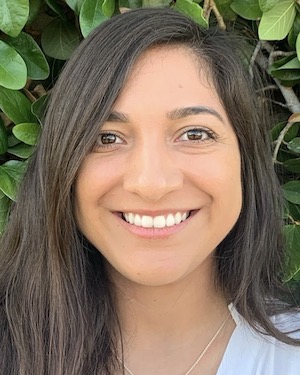
What Might My Schedule Look Like? ⟩
September 3, 2020, by Liz
Classes School/Life Balance
There’s so much that comes to mind when asking yourself, “what’s grad school like?” What will my schedule look like? Will I have time to do things I enjoy outside of school or is it super intense? Will I be able to work while enrolled in the program? Will I be able to take care of additional responsibilities? I wanted to share a little bit more about that through this post. To start off, here’s my Google calendar!
This reflects what my schedule looks like as a second year student. The pink squares are the times I am at work and the blue squares show when I am in class. The Hand Rehabilitation and PAMS courses are both the electives I chose for the semester. So, the schedule may look a little different for other students depending on their elective choices.
As you can see, for the most part my days start at about 9 AM, with 8 AM being the earliest. I am not really a morning person, however as I shared in one of my previous blog posts I took Lifestyle Redesign over the summer. Well, one of my goals while taking that elective was to switch my workout routine from the evening to the early morning in order to have more time to do other things later on in the day. Yes, it was definitely a struggle to try and do this, but staying active is something that is important to me! Anyway, I usually wake up at about 6:30 AM on Mondays and Wednesdays to get a little exercise in before class. I also work out on Friday and Sunday mornings, but wake up a bit later on those days to get some sleeping in. On the days that I do not exercise in the mornings, I wake up about an hour before class starts to make breakfast, tidy up my room, and get ready for class. So, be ready to start the day early in order to make it in time!
It’s only been two weeks since the fall semester started, and I already have a lot of readings to do for adult rehab. Adult rehab is one of the three practice immersions offered in our program. I’ve successfully completed pediatrics and mental health, so now I am tackling the final immersion! We have a quiz every week, which is first taken individually and then with our group. It’s important to get these readings done in order to be prepared for the quizzes, but also to get the most out of the learning experience. In addition to those readings, I also have readings for my other classes to get through.
As you can see from my calendar, I have Fridays and Sundays entirely free. I am also free Saturdays after 11:30 AM. I do most of my work during the weekend, but I also do some work during the week so as not to overwhelm myself. I would say I engage in roughly about 10 hours a week of study time. This includes reading for classes, any sort of presentation I have to work on, writing papers, reviewing class material and working on asynchronous assignments. This may sound like a lot, but it is doable. I will say, grad school is not like undergrad where you can maybe get away with not doing the readings! I find that actually reading for class has made me feel so much more prepared to engage during lecture and also to ask questions. Although I spend a lot of time doing stuff for school outside of class, I make sure to give myself little breaks throughout the day!
As far as work goes, as a student ambassador I am currently working 10 hours a week. Luckily, the job is very flexible. For example if I needed extra study time on Monday to review for an exam for Tuesday morning’s PAMS class I can shift my work time over to Friday. As I mentioned earlier, there is a lot of time that goes into studying during the week in addition to attending class. So, I think working while enrolled in the program is doable if your job is flexible and won’t interfere with schoolwork. I wouldn’t recommend working any more than 10 hours a week so that you don’t overwhelm yourself. But again, no one knows you better than you do and only you know what you can handle! If money is a huge stressor, there are several scholarship opportunities available within the Division, USC, and through outside sources that can help lift a little bit of that financial stress. There are also student worker positions available that can also help.
When I am not in class my schedule does allow me to spend time with the people I love! My partner and I enjoy ordering Shake Shack for dinner and watching movies. I also have time to visit my parents and my younger sister for a few hours during the weekend. I am also able to spend some time outside, watch Netflix, and hang out with my roomies. And as an update, I did get a new roomie, Max, who I am completely obsessed with! Here he is ready to take on the UCLA football team!
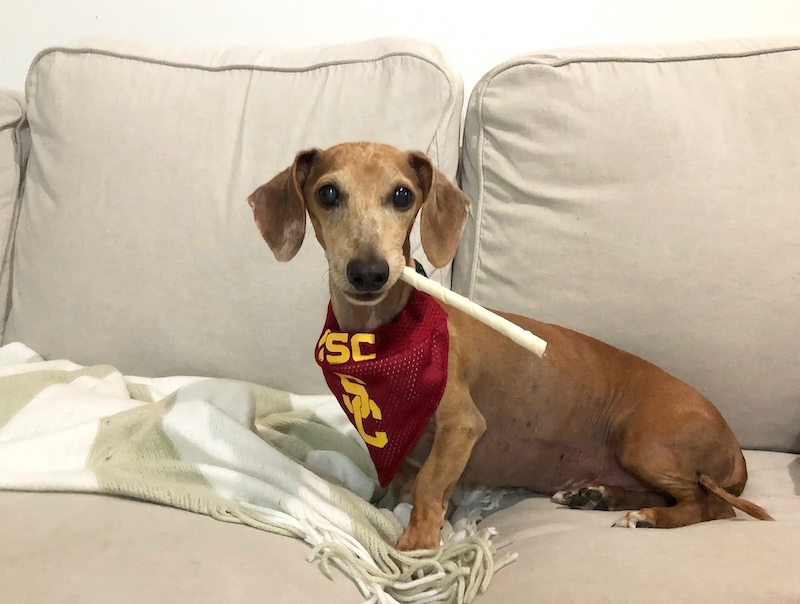
So, to wrap things up, definitely expect to put in a few hours into studying outside of class. You really do get what you put into it! But, also keep in mind that there’s time for you to do the things you love. It’s all about time management and really planning out your week/month in advance. You can do this!
⋯






